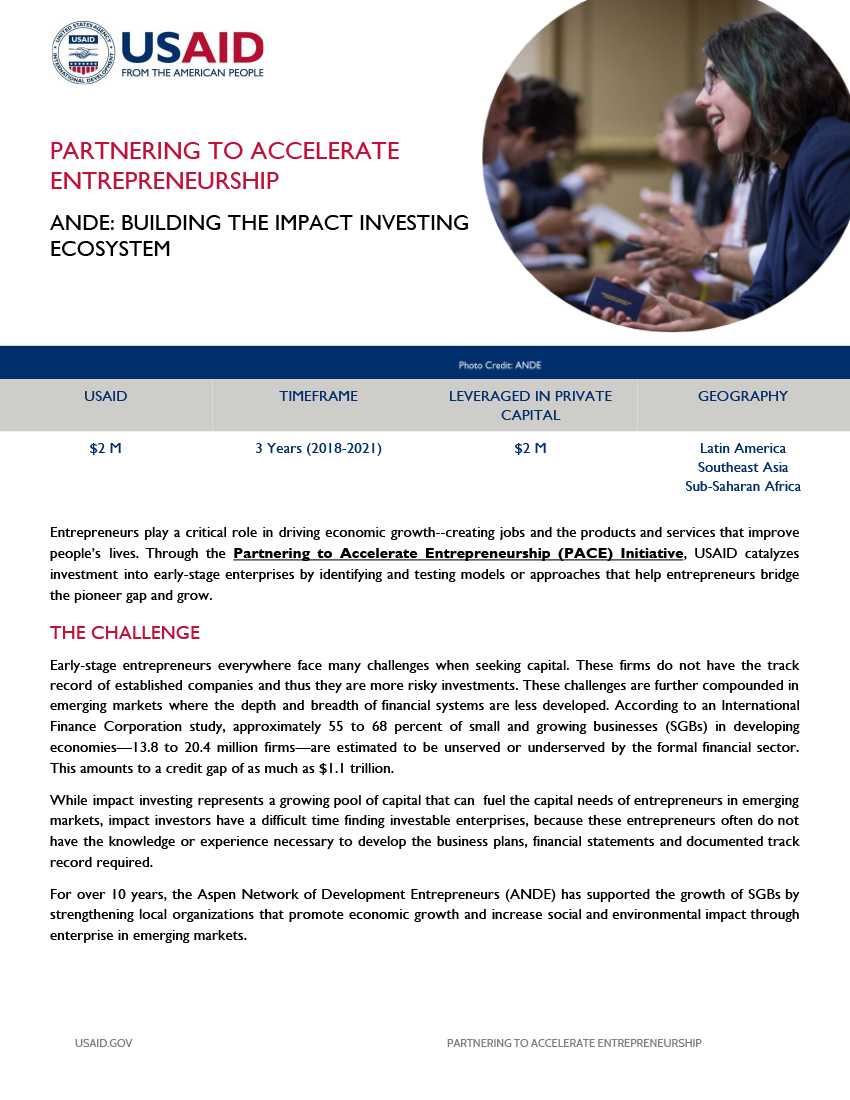- What We Do
- Agriculture and Food Security
- Democracy, Human Rights and Governance
- Economic Growth and Trade
- Education
- Environment and Global Climate Change
- Gender Equality and Women's Empowerment
- Global Health
- Humanitarian Assistance
- Transformation at USAID
- Water and Sanitation
- Working in Crises and Conflict
- U.S. Global Development Lab
Speeches Shim
Partnering to Accelerate Entrepreneurship (PACE)
Entrepreneurs play a critical role in driving economic growth--creating jobs and the products and services that improve people’s lives. Through the Partnering to Accelerate Entrepreneurship (PACE) Initiative, USAID catalyzes investment into early-stage enterprises by identifying and testing models or approaches that help entrepreneurs bridge the pioneer gap and grow.
THE CHALLENGE
Early-stage entrepreneurs everywhere face many challenges when seeking capital. These firms do not have the track record of established companies and thus they are more risky investments. These challenges are further compounded in emerging markets where the depth and breadth of financial systems are less developed. According to an International Finance Corporation study, approximately 55 to 68 percent of small and growing businesses (SGBs) in developing economies—13.8 to 20.4 million firms—are estimated to be unserved or underserved by the formal financial sector. This amounts to a credit gap of as much as $1.1 trillion.
While impact investing represents a growing pool of capital that can fuel the capital needs of entrepreneurs in emerging markets, impact investors have a difficult time finding investable enterprises, because these entrepreneurs often do not have the knowledge or experience necessary to develop the business plans, financial statements and documented track record required.
For over 10 years, the Aspen Network of Development Entrepreneurs (ANDE) has supported the growth of SGBs by strengthening local organizations that promote economic growth and increase social and environmental impact through enterprise in emerging markets.
| USAID | TIMEFRAME | LEVERAGED IN PRIVATE CAPITAL | GEOGRAPHY |
|---|---|---|---|
| $2 M | 3 Years (2018-2021) | $2 M | Latin America Southeast Asia Sub-Saharan Africa |
THE PARTNERSHIP
The USAID and ANDE partnership through the PACE initiative strengthens entrepreneurial ecosystems around the world. The alliance contributes to achieving USAID’s objectives to catalyze private sector investment into early-stage enterprises and identify models or approaches that bridge the SGB funding gap. Funding from USAID supports ANDE chapters to deepen their local engagement and learn from each other.
ANDE developed its own information technology infrastructure to support membership engagement, global communications, and SGB sector advocacy. Regional chapters map players in the local entrepreneurial ecosystem and identify gaps. They also deliver local training, lead learning labs on topics such as gender, impact assessment, and corporate engagement, and host career fairs.
ANDE brings together organizations that provide financial and nonfinancial support for entrepreneurs, and encourages knowledge sharing, new partnerships, and better coordination among its members and networks. The organization also produces research and insights that can guide the SGB sector as a whole. The ANDE network provides opportunities for experts in different fields to learn from one another, fostering innovation in support of SGBs.
Chapter activities in eight key markets--the Andean region, Brazil, Central America and Mexico, East and Southeast Asia, India, South Africa, and West Africa--build strong regional connections and foster collaborative initiatives to improve business environments.
RESULTS
ANDE aims to strengthen local ecosystems and organizations that provide training, networking, advisory services, and finance to SGBs. The strengthened ecosystems, in turn, support the advancement of market-based solutions that create quality jobs and produce goods and services that advance development. Through the support of USAID and Ford Foundation, ANDE grew its alliance to 320 members by 2020, generating close to $1.7 million in annual dues. The alliance covers most emerging markets --and their ecosystem snapshot tool has been used to analyze the health of local ecosystems in nearly 20 markets.
ANDE will continue to develop local talent in ways that are beneficial to the organization and its employees, while ensuring that institutional knowledge is codified and shared--both within the organization as well as across its network.
FOR MORE INFORMATION
To learn more about the PACE Initiative, visit usaid.gov/pace or contact: pace@usaid.gov.
About the United States Agency for International Development
USAID is the world's premier international development agency and a catalytic actor driving development results. USAID's work advances U.S. national security and economic prosperity, demonstrates American generosity, and promotes a path to recipient self-reliance and resilience.


Comment
Make a general inquiry or suggest an improvement.